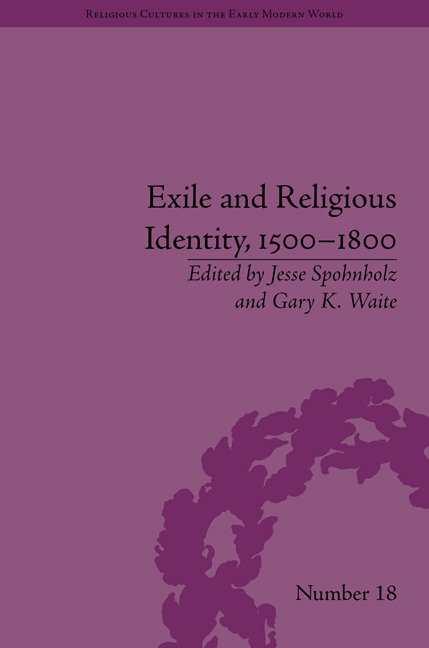Book contents
- Frontmatter
- CONTENTS
- Acknowledgements
- List of Contributors
- List of Figures and Tables
- Introduction
- Part I The Experience of Exile and the Consolidation of Religious Identities
- Part II The Experience of Exile and the Destabilization of Religious Identities
- 5 Dirck Volckertz Coornhert: Exile and Religious Coexistence
- 6 Isaac Nabrusch, Christian and Jew: A Pious Man at Life's Many Crossroads
- 7 Justus Velsius Haganus: An Erudite but Rambling Prophet
- 8 Instability and Insecurity: Dutch Women Refugees in Germany and England, 1550–1600
- 9 Heresy and Commercial Exchanges in Early Modern Northern Spain
- Part III The Memory of Exile
- Notes
- Index
5 - Dirck Volckertz Coornhert: Exile and Religious Coexistence
from Part II - The Experience of Exile and the Destabilization of Religious Identities
- Frontmatter
- CONTENTS
- Acknowledgements
- List of Contributors
- List of Figures and Tables
- Introduction
- Part I The Experience of Exile and the Consolidation of Religious Identities
- Part II The Experience of Exile and the Destabilization of Religious Identities
- 5 Dirck Volckertz Coornhert: Exile and Religious Coexistence
- 6 Isaac Nabrusch, Christian and Jew: A Pious Man at Life's Many Crossroads
- 7 Justus Velsius Haganus: An Erudite but Rambling Prophet
- 8 Instability and Insecurity: Dutch Women Refugees in Germany and England, 1550–1600
- 9 Heresy and Commercial Exchanges in Early Modern Northern Spain
- Part III The Memory of Exile
- Notes
- Index
Summary
According to the late Heiko Oberman, ‘exile’ profoundly marked the Reformed identity. He coined the term Exulantentheologie to explain how the experience of exile induced believers towards a firm, radical Calvinistic stance. A welldescribed confessional identity and serious ecclesiastical discipline served to define the boundaries of their own group. The doctrine of predestination provided comfort to these exiles since it assured them that they belonged to the body elect. Oberman's theory has become influential in at least three ways. First, historians after Oberman have continued to emphasize ‘exile experience’ as an important component of the Reformed identity. Moreover, scholars of the nascent Dutch Republic have used this paradigm to describe the emerging character of the ‘public church’. According to many historians, the Dutch Reformed Church went through a process of radicalization due to the influx of many former refugees. These former exiles adhered to a staunchly Calvinistic doctrine and steered the public church in a more radical direction. The influence of these former exiles contributed to the victory of radical Calvinism over a more moderate Reformed Protestantism during the Synod of Dordt (1618–19). Third, and more recently, scholars have used this theory to explain the revitalizing of Catholicism in the Southern Netherlands. The hardships of exile are used to explain the readiness to confess one's faith; exile induced many believers to ‘a more self-conscious confessional attitude’. In recent literature exile has oft en been treated as a ‘catalyst for radicalisation’.
- Type
- Chapter
- Information
- Exile and Religious Identity, 1500–1800 , pp. 67 - 80Publisher: Pickering & ChattoFirst published in: 2014

